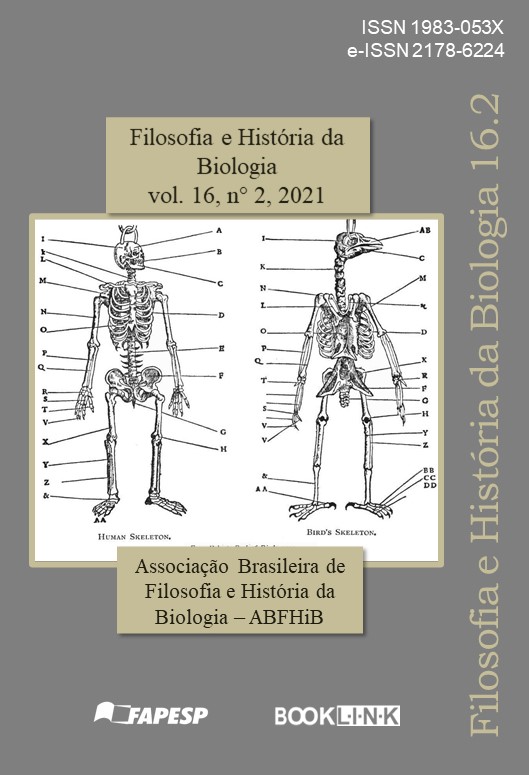A natureza humana e o altruísmo em Sociobiology: the new synthesis de Edward Wilson
DOI:
https://doi.org/10.11606/issn.2178-6224v16i2p262-281Palavras-chave:
História da biologia, Edward Wilson, Socioiologia, Altruísmo, DarwinismoResumo
O conceito de natureza humana é alvo de discussão entre especialistas das ciências humanas e naturais. Um marco incontornável do debate é o livro Sociobiology: the new synthesis de Edward Wilson e sua interpretação darwinista do comportamento humano. O presente artigo investiga os principais instrumentos teóricos e conhecimentos científicos usados pelo autor para realizar esse tipo de interpretação. Defendemos que, ao fazê-lo, Wilson almeja dialogar com especialistas de outras áreas e “biologizar” as humanidades. Exploraremos em particular como o autor explica a natureza humana a partir do dilema altruísmo-egoísmo. Identificamos que a análise de Wilson sobre o comportamento humano assume a forma de premissas e inferências envolvendo a ubiquidade, a origem genética, a adaptação e o tratamento matemático.
Referências
BOORMAN, Scott. A, LEVITT, Paul. Group selection on the boundary of a stable population. Proceedings of the National Academy of Sciences, U.S.A., 69 (9): 2711-2713, 1972. DOI: https://doi.org/10.1073/pnas.69.9.2711
BOORMAN, Scott. A, LEVITT, Paul. Group selection on the boundary of a stable population. Theoretical Population Biology, 4 (1): 85-128, 1973. DOI: https://doi.org/10.1016/0040-5809(73)90007-5
FOX, Robin. The cultural animal. Pp. 263- 296, in: EISENBERG, J. F.; DILLON, W. S. (Eds.). Man and beast: comparative social behaviour. Washington: Smithsonian Institution Press, 1971.
GOULD, Stephen J.; LEWONTIN, Richard. The spandrels of San Marco and the Panglossian paradigm: a critique of the adaptationist programme. Proceedings of the Royal Society B: Biological Sciences, 205 (1161): 581-598, 1979. DOI: https://doi.org/10.1098/rspb.1979.0086
HAMILTON, William D. The genetical evolution of social behaviour. II. Journal of Theoretical Biology, 7 (1): 17-52, 1964. DOI: https://doi.org/10.1016/0022-5193(64)90039-6
HAMILTON, William D. The moulding of senescence by natural selection. Journal of Theoretical Biology, 12 (1): 12-45, 1966. DOI: https://doi.org/10.1016/0022-5193(66)90184-6
HAMILTON, William D. Geometry for the selfish herd. Jounal of Theoretical Biology, 31 (2): 295-311, 197la. DOI: https://doi.org/10.1016/0022-5193(71)90189-5
HAMILTON, William D. Selection of selfish and altruistic behaviour in some extreme models. Pp. 57-91, in: EISENBERG, J. F.; DILLON, W. S (eds.). Man and beast: comparative social behaviour. Washington: Smithsonian Institution Press, 1971b.
HAMILTON, William D. Altruism and related phenomena, mainly in social insects. Annual Review of Ecology and Systematics, 3 (1): 193-232. 1972. DOI: https://doi.org/10.1146/annurev.es.03.110172.001205
KOHLBERG, Lawrence. Stage and sequence: the cognitive-developmental approach to socialization. Pp. 347-480, in: GOSLIN, David A. (ed). Handbook of socialization theory and research. Chicago: Rand McNally Co., 1969.
LEVALLOIS, Clement. The development of sociobiology in relation to animal behavior studies, 1946-1975. Journal of the History of Biology, 51(3): 419-444. DOI: https://doi.org/10.1007/s10739-017-9491-x
LEVINS, Richard. Extinction. Pp. 75-107, in: GERSTENHABER, Murray. (ed.) Some mathematical questions in biology. Lectures on Mathematics in the Life Sciences, vol. 2. Providence: American Mathematical Society, 1970.
LEWONTIN, Richard; LEVINS, Richard; Biology under the influence: dialectal essays on ecology, agriculture, and health. New York: Monthly Review Press. 2007.
MASTERS, Roger D. Genes, language, and evolution. Semiotica, 2(4): 295-320, 1970. DOI: https://doi.org/10.1515/semi.1970.2.4.295
ROSE, Steven; LEWONTIN, Richard; KAMIN, Leon. Not in our genes: biology, ideology, and human nature. New York: Pantheon Books, 1984.
TRIVERS, Robert L. The evolution of reciprocal altruism. Quarterly Review of Biology, 46 (4): 35-5, 1971. DOI: https://doi.org/10.1086/406755
TRIVERS, Robert L. Parent-offspring conflict. American Zoologist, 14 (1): 249-264, 1974. DOI: https://doi.org/10.1093/icb/14.1.249
WASHBURN, Sherwood L.; HOWELL, F. Clarck. Human evolution and culture. Pp. 33-56, in: TAX, Sol (ed). Evolution after Dar-win. vol. 2, Evolution of man. Chicago: University of Chicago Press, 1960.
WHITING, John WM. Discussion, Are the hunter-gatherers a cultural type? Pp. 336-339, in: LEE, Richard B.; DeVORE, Irven (eds). Man the hunter. Chicago: Aldine Publishing Co., 1968.
WILSON, Edward. Sociobiology: the new synthesis. Cambridge, MA: The Belknap Press, 1975.
Downloads
Publicado
Edição
Seção
Licença
Copyright (c) 2021 Filosofia e História da Biologia

Este trabalho está licenciado sob uma licença Creative Commons Attribution-NonCommercial-ShareAlike 4.0 International License.
Os manuscritos publicados passam a ser propriedade da revista Filosofia e História da Biologia, e os autores aceitam os termos desta licença e concordam em ceder os direitos autorais para a publicação, além de concordarem com o compromisso da publicação em oferecer acesso aberto a todo o seu conteúdo. As informações e conceitos emitidos em artigos assinados são de absoluta responsabilidade de seus autores.


 cademia.edu
cademia.edu
